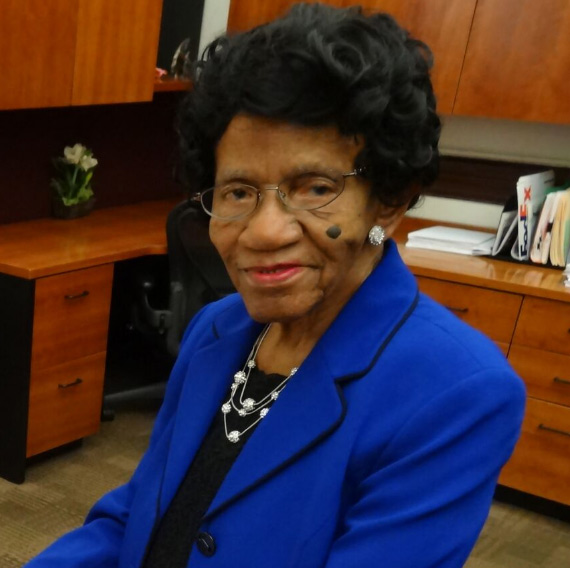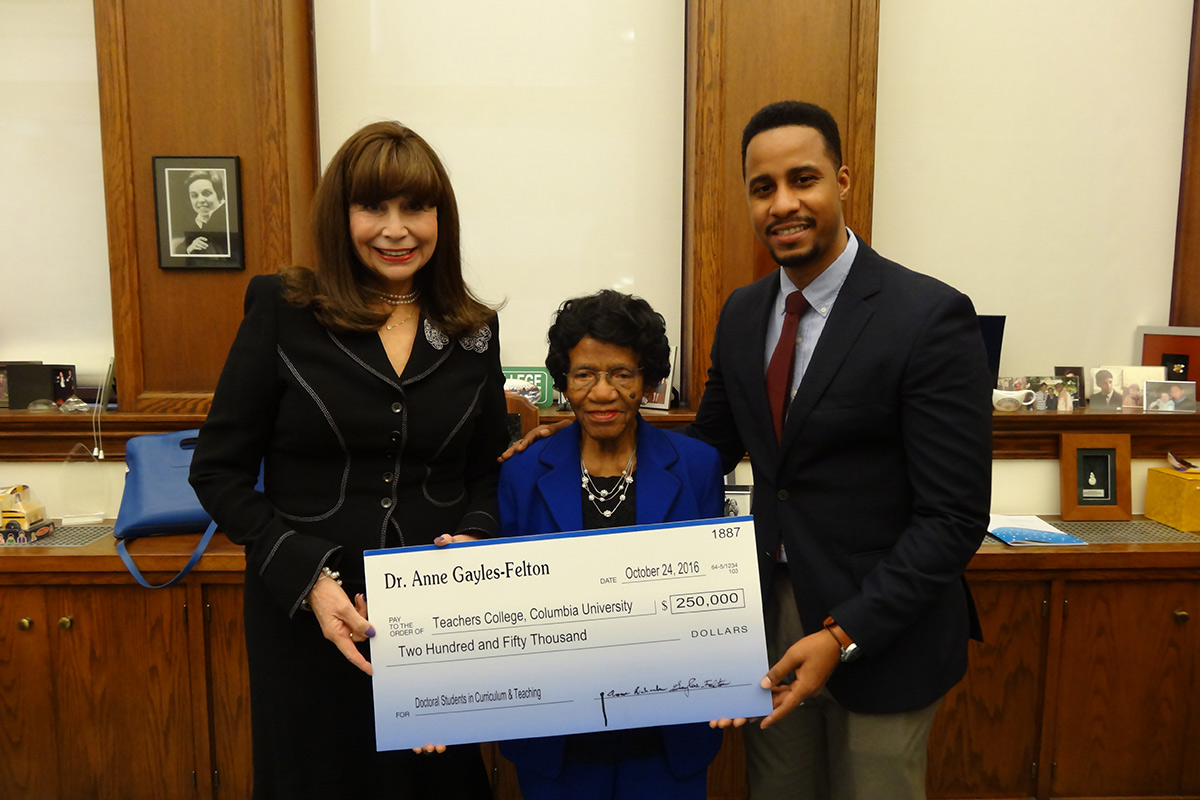Ask 93-year-old Anne Richardson Gayles-Felton (M.A. ’47) why she is endowing a $250,000 scholarship at Teachers College and she’ll likely start out with the short answer.
“I was born into a family of educators,” says Gayles-Felton, Professor Emerita at Florida A&M University (FAMU), and one of a small group of lifetime honorees in the pantheon of the National Association of Teacher Educators (ATE).

Gayles-Felton has endowed a $250,000 scholarship at Teachers College. A member of TC's Grace Dodge Society, she joins a select group of donors who have not only planned for the College in their wills, but also made outright gifts to create scholarships that will benefit students right now. the first beneficiary of Gayles-Felton's generosity is Curriculum & Teaching doctoral student Angel Acosta.
But for a more visceral understanding of what motivates Gayles-Felton, the best source may be a tiny footnote in an obscure history titled What a Woman Ought to Be and Do: Black Professional Women Workers During the Jim Crow Era, by Stephanie J. Shaw (University of Chicago Press, 1996). Referring to an 1898 article in the Atlanta University Bulletin titled “The Negro Girl in the Rural District,” the author writes:
“Mrs. Anna (Wade) Richardson, who graduated from Atlanta University in 1885 and in 1898, was a school principal in Marshallville, Georgia. The article reported that when Richardson arrived in Marshallville, ‘whiskey dens’ were on almost every corner, none of the children could read, and all their homes were disorderly. By her influence the town had been voted dry, almost all the children could read and write, many of her former students were now teachers, and many of the community people now owned their homes and had improved them. Also, all of Richardson’s teachers professed to be Christians.”
Anna Wade Richardson was Gayles-Felton’s grandmother, and though they never met, she profoundly shaped Gayles-Felton’s life through her school and her teaching.
“My grandma’s parents had been slaves, though they were free by the time she was born,” recalls Gayles-Felton, a small, energetic woman with an earnest manner. “She and my grandpa met at Atlanta University, and then, with the help of the American Missionary Association, she established a Congregationalist boarding school [the Lamson-Richardson School] in her home town, Marshallville, in 1886. She wanted each black child in her community to have a school – that’s why she built one. After she died, my grandfather took it over, and then my aunt. It survived for 113 years before it became part of the Macon County public school system. I did my own first teaching there.”
“I learned that people are people, and I still have that philosophy today. And I feel sorry for those who haven’t learned to overcome their prejudices.”
—Anne Gayles-Felton
In fact, Gayles-Felton more or less grew up in that school because, as a little girl, she went to live with her aunt after her own mother died. As she tells it, at a time when most of the black children around her were growing up without much education, in homes that lacked electricity, telephones and indoor plumbing, she was benefiting from all of those things. She was also learning to take a broader perspective on society around her.
“My grandfather was an educated politician – a revenue collector for the government – so he was in a position to help many whites get jobs,” she says. “He protected us from a lot of the prejudice I might have otherwise encountered. So I was accustomed to integrating before we integrated in the South. I never hated white people. I was around those trying to help us. So I learned that people are people, and I still have that philosophy today. And I feel sorry for those who haven’t learned to overcome their prejudices.”
In the summers, Gayles-Felton accompanied her aunt to New York City, where the latter took courses at Teachers College – “as many Southern blacks of that era did,” Gayles-Felton notes, because they were denied admission by schools of education in their home states. Though Gayles-Felton herself was just a teenager, the experience clearly stuck. A decade later – after earning her undergraduate degree at Georgia’s Fort Valley State College, studying sociology for a year at Fisk University in Nashville and teaching social studies for five years in various Georgia high schools – she enrolled at TC, a decision that would change her career.
Thanks to three professors – Florence Stratemyer, George Counts and Margaret Lindsay – Gayles-Felton decided to switch her focus from teaching high school students to teaching teachers.
“I was so stimulated by them that I not only wanted to be a good teacher but an outstanding teacher of teachers,” she recalls. “Stratemyer, in particular, taught us to be an active participant in teacher professional organizations – to help shape their guidelines and apply them to our own teaching. I started going to meetings to do more than just have a good time. I really got involved in the decision-making.”
“[Dewey’s] philosophy of learning by doing made so much sense to me, because TC was not only teaching the theory, but teaching us through the theory. People were saying, ‘What do you need coming from the South? How can I help?’ And they really helped me.”
—Anne Gayles-Felton
More broadly, she was inspired by the ideas of TC’s great education philosopher, John Dewey.
“I didn’t study with him, but they used his books like mad,” she recalls. “His philosophy of learning by doing made so much sense to me, because TC was not only teaching the theory, but teaching us through the theory. People were saying, ‘What do you need coming from the South? How can I help?’ And they really helped me.”
Gayles-Felton, who subsequently earned an Ed.D. at Indiana University, went on to do much the same for students at FAMU, a public, historically black university in Tallahassee. During her nearly 50 years there, she served variously as Undergraduate and Graduate Professor of Secondary Education and Foundations, College Supervisor of Interns, Director of Student Teaching, Curriculum Coordinator, and Head of the Department of Secondary Education and Foundations.
In 2002, with Marian Smith and William Castine, she coauthored the book The History of the College of Education-Florida Agricultural and Mechanical University: 1887-2000, the proceeds of which have been used to create and support scholarships in FAMU’s College of Education.
“The biggest challenge facing our education system now is how to produce relevant learning experiences for the students of today, who are so different than those of yesterday. Are you really getting to the core of what life is about for them?”
—Anne Gayles-Felton
Gayles-Felton retired in 2003, but she’s kept pretty busy. She still goes to professional meetings and stays involved in the activities of selected professional organizations. She continues to receive honors and awards: In 2006, she was inducted into the FAMU College of Education’s Gallery of Distinction. In 2007, she received the meritorious achievement award from FAMU itself, the highest honor the institution bestows. She has also received the Honorary Doctorate of Humane Letters from Fort Valley State University; was inducted as a Distinguished Member of the National Association of Teacher Educators; and, in 2015, received TC’s Distinguished Alumni Award.
She’s active in her retirement community, Westminster Oaks, where she has financed in-service education programs for residents, and where, not long ago, she donated the original bell from the Lamson-Richardson School. She has remained active in Delta Sigma Theta Sorority, Inc., Alpha Kappa Mu, Pi Delta Kappa, Pi Gamma Mu, Pi Lambda Theta, and Kappa Delta Pi International. And recently she paid a visit to Teachers College to present the check to TC President Susan Fuhrman for the new Anne Richardson Gayles-Felton Scholarship. It’s the seventh scholarship/educational fund Gayles-Felton has created, adding TC to a list of institutions that includes or will include Indiana University, Florida A & M University, Fort Valley State University, Talladega College (another historically black institution), The Association of Teacher Educators, Delta Sigma Theta and Westminster Oaks Retirement Home.
At TC, Gayles-Felton, who is a member of the College’s Grace Dodge Society, now joins who have not only planned for the College in their wills but also made outright gifts to create scholarships that will benefit students right now. The first beneficiary of Gayles-Felton’s generosity is Angel Acosta, a doctoral student in TC’s Department of Curriculum & Teaching .
“Some people think I’m nuts giving away all this money, but I want to do it, and I enjoy it, because my grandma had the spirit of helping those who needed help,” she says. “That’s what my grandma and my whole family are all about.”
—Joe Levine
What Good Teaching Requires: a Fifty-Year Perspective
After more than half a century of teaching – first in high schools, and then as a teacher of teacher educators – Anne Richardson Gayles-Felton has some pretty clear ideas about what it takes to lead a classroom:
You have to understand your subject matter.
You have to know how to motivate students to want to fulfill the shared objectives of the classroom.
Motivation is essential to learning. Therefore teachers should use a variety of intrinsic motivating devices to arouse their students’ interest in achieving instructional objectives.
You have to provide for individual differences.
Rethink these questions:
- Do you really like people?
- Do you really like to help people?
- Do you believe in change? (Teachers should periodically modify and change curricular experiences to reflect immediate individual and societal changes.)
One of the most difficult aspects of teaching for many is in the area of formulating objectives. What do you want the child to learn, and how do you plan to evaluate progress?
Teachers should evaluate children in terms of the instructional objectives, not by other criteria.
Teachers should be knowledgeable about current events and relate them to teaching.
Teachers should use critical thinking approaches. Too many simply go chapter by chapter and just have their students memorize the information. That’s not real teaching.
The biggest challenge facing our education system now is how to produce relevant learning experiences for the students of today, who are so different than those of yesterday. Are you really getting to the core of what life is about for them? If not, you’re leaving them behind.
